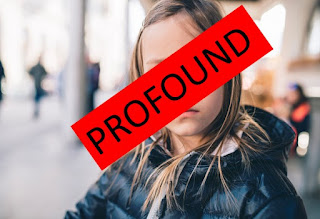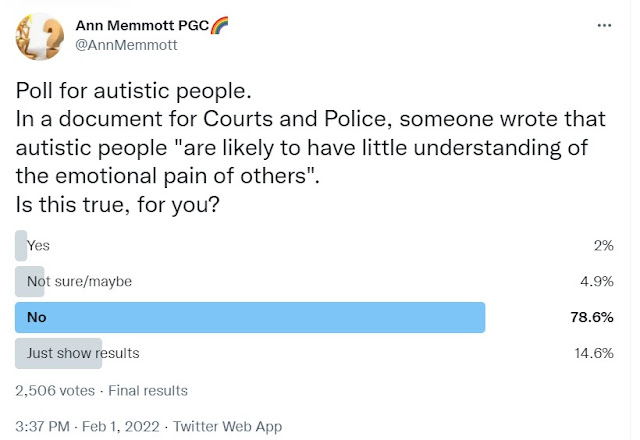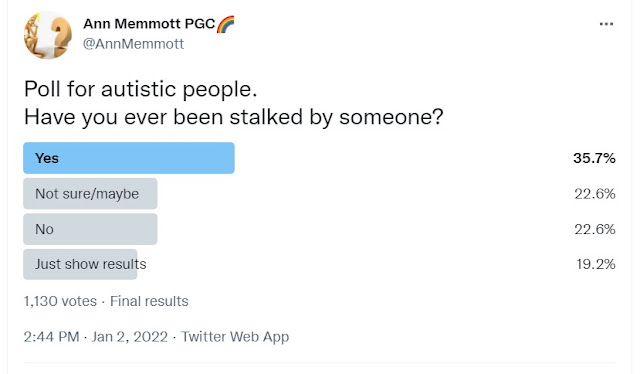Fairly regularly, we get a few well-connected parents demanding that their autistic child be given a 'profound autism' label. They often claim that their child cannot communicate at all, and that their child lives in fairly permanent distress solely because of being autistic.
They reason that the moment their child has this word Profound attached to their file, their lives will be transformed.
Oddly, the same parents describe their child's actual list of difficulties. These often include, on the lists...
Not having their communication enabled.
Extremely high anxiety levels.
An intellectual disability.
Epilepsy.
For some reason, some professional told the parent that those things are 'profound autism', and they are completely convinced that their child cannot access proper support for any of those things without the word Profound in the file.
It's very strange, isn't it.
And it's not accurate. At all.
It's vital that each child gets tailored support. This is easily achieved, in theory, by writing down the correct things on their file, as well as fully respecting them as a human being and fully respecting the warm, loving and caring relationships they need to thrive. If they need communication support, they should have that. If they need sensory accommodations, they should get those. If they have an actual medical condition such as epilepsy, of course they should have appropriate medical support. If they are in such distress that they are self-harming, absolutely we should investigate the cause of the distress and lessen it.
We should improve their quality of life and improve their communication methods so they can partner with us in finding their own best ways forward. And yes, I mean enabling the communication of all children. All children can communicate. Not all do using words. We need to be skilled in understanding what they are communicating, and skilled in understanding that autistic communication is often different.
My concerns about the thinking are more than just bafflement about the alleged magic of the word Profound, though.
Regularly, those of us who work in the field of autism, as researchers, lecturers and advisers, encounter some rogue individuals and teams. A subgroup of people who enjoy finding children who are believed not to be able to communicate, ones who are believed to be 'too disabled' to speak out about what's done to them. We don't have to go far to find horrific media reports on what happens. Not everyone is a pleasant individual with a child's best interests at heart. You don't want to know the statistics on how many children's organisations have predators in their midst. The word 'profound' doesn't guard against this. It may make the situation worse.
When I attend care settings to advise on a child or young person with higher support needs, what I need is an accurate summary on the file. For example: (fictional)
"This is Sam. Sam is 7 years old and likes spending time with her pet dog, and with her brother and Dad. Sam loves the colour blue and enjoys watching cartoons with people she trusts. Sam gets on very well with person x and person y here, and uses communication system x to let people know what she needs. (Further details on Sam's strengths and joys).
Sam is autistic, enjoying a predictable routine and really clear instructions. Sam also has an intellectual disability meaning that (examples) . Sam is having treatment for epilepsy, and has sensory needs which include deep pressure from (e.g. weighted blanket etc) and avoiding sudden loud noise. See the full OT report in Appendix 2 which details the sensory accommodations needed.
If Sam is starting to be distressed, she may do X, or Y and then benefits from seeking a quiet space with a trusted person with her and toys A and B. If Sam cannot regulate and becomes more distressed, this is the list of safe, respectful ways we work with Sam to help her regulate and recover...(list)"
I'm now getting a really good idea about Sam as a young person to be respected. Sam as a fellow human being. Sam's strengths, interests and joys. Sam's loved people and relationships. Sam having agency in their lives. Sam having an accurate list of how their brain best works, and what sort of medical and communication/sensory needs they benefit from. I now have something I can use to help evaluate how well we are meeting Sam's needs, so that we can all work together - Sam, team, family, our advisers, to improve things still further. It's collaborative, positive, respectful and - at all times - considering Sam's human rights. The team around Sam is picked to be caring, responsible, enabling, able to build trusted relationships, calm and friendly. If they make an error, they want to learn from it.
Such places exist. Such files notes exist. The young people in such settings have a life where they can thrive.
There is no part of that process that is improved by slapping the word PROFOUND on the front of the file.
Thank you for reading.




